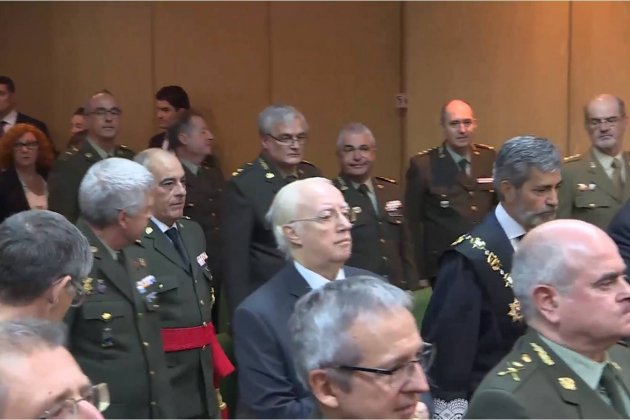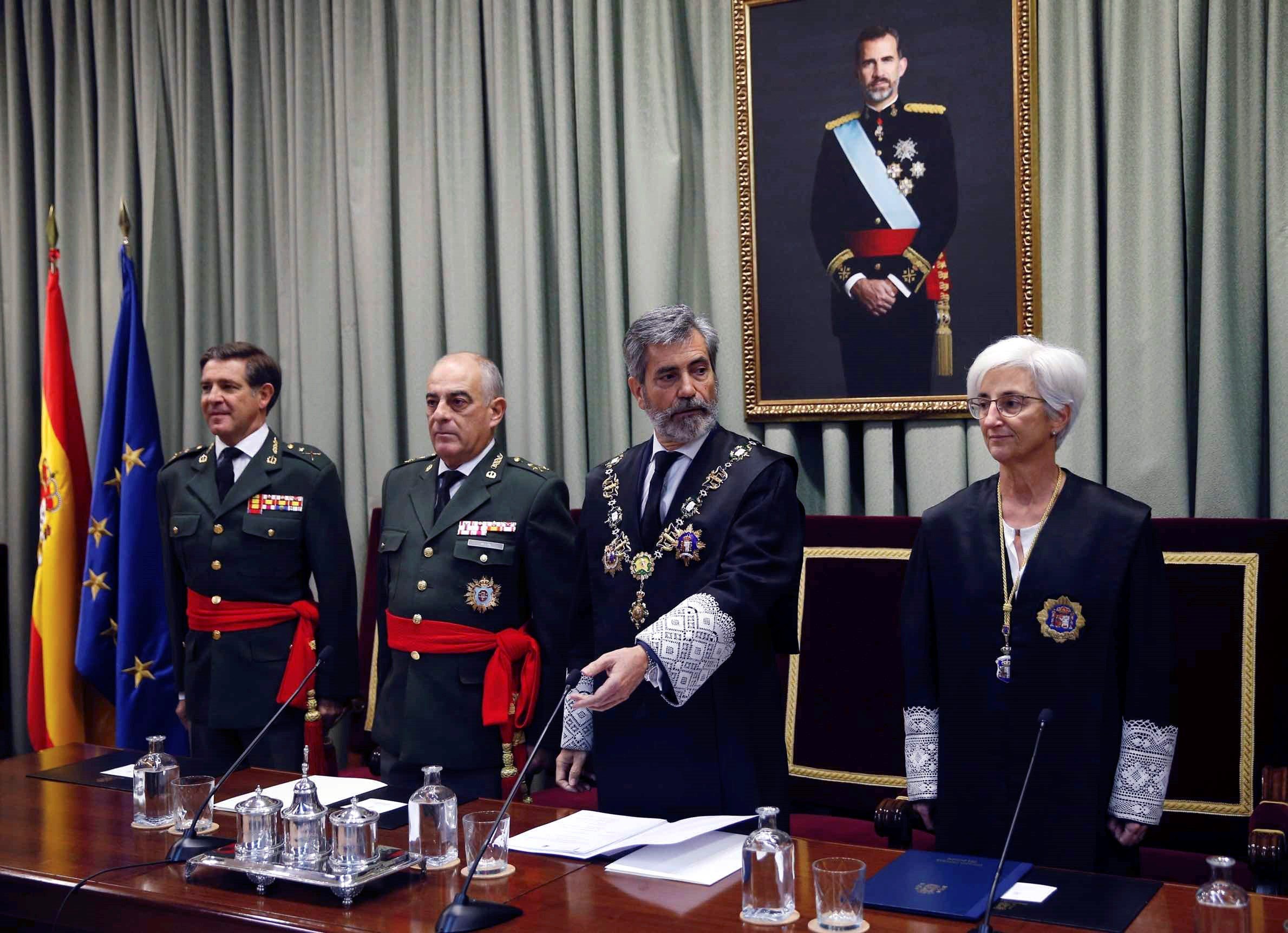"A diminutive but noisy part of society, made up of citizens blinded by irrationality, is frontally attacking the basis of our democracy." These were the words of the most senior judge in Spain, Carlos Lesmes, acting president of both the Supreme Court and the top judicial authority, the General Council of the Judiciary, in an address on Tuesday at the headquarters of Spanish military justice. Lesmes devoted the entire first part of his speech - whose English translation can be read below - to an interpretation of events in Catalonia "since the judgement in the so-called trial of the Procés", as he put it, adopting the popular phrase that equates the recently concluded Supreme Court trial of 12 pro-independence leaders with a judgement against the entire Catalan independence process.
The judge explained to his audience of senior figures in Spain's military and judicial spheres that those who use "force and violence to try and break the model of social coexistence" will have to face the consequences. Quoting from the Greek tragedy Antigone, he recalled that "a State where insolence and the freedom to do anything go unpunished, ends up sinking into the abyss."
Lesmes asserted that all the powers in the Spanish state needed to “be guided exclusively by full respect for the law and from the rule of law”. "There is only one clear objective: the defence of our 1978 Constitution," he said, which he characterised as the Spanish state's “soul", in another reference chosen from ancient Greece. "In this mission to protect the "soul of the State", I would like us to pay special attention to the importance of justice to guarantee the supremacy of the law and the protection of individual and collective rights," he concluded.
During his speech, for which the Spanish attorney general, María José Segarra, was also present, he referred to Catalonia by name as the place where this "frontal attack" on democracy is occurring. In the Supreme Court president's interpretation, this attack by the "noisy" "blinded" "irrational" and "violent" minority he refers to is aimed at destroying "social coexistence", which is the foundation for "respect for the law and the rights and freedoms of others" (curiously, he later says that the relationship is the reverse: that "respect for the law, and the rule of law" are the pillars on which the "peaceful coexistence of citizens" is based).
Carlos Lesmes's comments in full
Here is a complete translation of the first section of Carlos Lesmes's speech, the part he devoted to the current situation in Catalonia, corresponding to the content of the video above:
"Let me begin my address by referring directly to the situation we have been experiencing in recent weeks in Spain.
Indeed, since the Judgment issued by the Criminal Chamber of the Supreme Court in Special Case No. 3/20907/2017, that is, the judgment in the so-called trial of the Procés, different events have taken place in our country which concern us all and whose perspective we must not lose sight of.
A diminutive but noisy part of society, made up of citizens blinded by irrationality, is frontally attacking the basis of our democracy, using force and violence to try and break the model of social coexistence upon which rest the basic principles of our society, the pillars of constitutional Spain, which are none other than respect for the law and the rights and freedoms of others.
It was precisely Sophocles, the author of Antigone - the Greek tragedy which was a paradigm of disobedience to the law - who wrote that "a State where insolence and the freedom to do anything go unpunished, ends up sinking into the abyss."
And so, I think it is precisely in circumstances such as those that are occurring in Catalonia, in times of anxiety and indeterminacy like the current ones, when, to prevent our vessels from falling into that abyss that the Greek poet spoke of, we must reassert with absolute firmness our conviction that its direction must be guided exclusively by full respect for the law and from the rule of law, as immutable pillars on which the peaceful coexistence of citizens is based.
Only with the firmness of our convictions in democratic values, as well as the effectiveness of full submission to the law not only by the citizens but also by the various powers of the State, can a society overcome the various difficulties and challenges that are being raised in each historical period. And I firmly believe that each of us, from his position in the machinery that make up the State, has an important role to play in this commitment that all Spaniards made over 40 years ago for democracy.
There is only one clear objective in this combination of different functions that each one must carry out in his respective sphere: the defence of our 1978 Constitution. And in that mission of protection of the “soul of the State” (as the Greek philosopher and orator Isocrates called the Constitution of States), I would like us to pay special attention to the importance of Justice, as the principal tool that society uses, to guarantee the supremacy of the law and the protection of individual and collective rights."

Carlos Lesmes (at right, wearing robe) enters Spain's military justice headquarters to give his speech on Tuesday. Image: EFE.
Lesmes, acting president
The judge Carlos Lesmes was appointed president of Spain's Supreme Court and its General Council of the Judiciary in 2013 and his term in the posts lasted until 2018. It was speculated that he would then be succeeded by judge Manuel Marchena. However, the new appointment, which is supposedly the choice of the General Council judges and lawyers themselves, exploded in controversy after the leak of a Whatsapp message sent by PP senator Ignacio Cosidó, which revealed how the two main political parties, PP and PSOE, had made a pact to install Marchena as top judge, which the Council members (themselves nominated by the political parties) were then expected to rubber stamp. To diffuse the scandal, Marchena announced he would continue in his existing role as president of the criminal branch of the Supreme Court, thus allowing him to preside over this year's trial of the 12 Catalan pro-independence leaders. Meanwhile, Lesmes has also continued in his own roles, on an "acting" basis.

